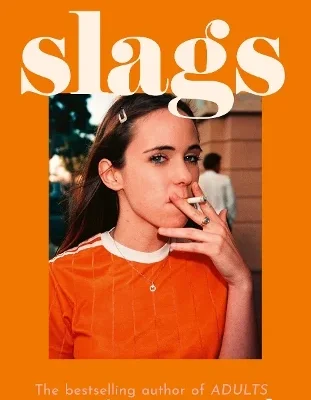6th November 2023
Listen
Listen

What is a slag? Am I one? Are you one? Can it be light-hearted teasing, tossed playfully from one girlfriend to another? Maybe a satirical quip to the loud and uninhabited declarations of sexual adventures, the slaggy adventures holding the admiration of her peers in her hand, locked together with the other girls, in a space that is safe to talk freely in. Otherwise, is ‘slag’ a poisonous residue that lingers in your mind: the word biting, a weapon, as if your sexual past is a poison that should not have existed in the first place.
Personally, to me, it’s a no. This is in part due to the word being an anachronism of the 90s; the punch it used to pack would fall flat, whether used merrily or mercilessly. That’s not to say the scathing shame it once held hasn’t been repackaged into new words that aim for the jugular.
Emma Jane Unsworth’s third novel: SLAGS draws upon the contradictions of what it is to be considered such; it is both funny and tear-jerking. It’s a coming-of-age story redefined, framing the life of Sarah Connell across two timelines: once when she was a fifteen-year-old girl in the 90s, and again in her forties, road tripping around the highlands of Scotland in a motorhome with her sister, Juliette.
Unsworth was astute and careful when writing about the experience a teenage girl. Often, the nuances of ego, obsession, naivety and the conflicting nature of sisterhood, are lost or disregarded when building the character of an adolescent girl. While it has been three decades since the nineties, these universal dimensions remain poignant today and are important to represent, particularly when discussing how these multifaceted, and often clashing traits, can leave teenage girls vulnerable to people, particularly as Unsworth explores, grown men, to exploit such vulnerabilities.
This was an aspect of the book I was not prepared to read when I opened it. As the book progresses, the entanglement of psychological tactics employed by adult men on young girls placed in adult situations, becomes an intricate web of pain. Initially, outlined is the elation and humour-among-friends, found in mistaking a predatory relationship from an illicit romance, evolves into an unrelenting amalgamation of shame and isolation, as it is realised what was once thought of as romantic, is in reality, heart-breakingly tragic.
At the Liverpool literary festival, Unsworth posited how can you protect and empower someone at the same time. Being fifteen is an age where empowerment is tantalisingly out of grasp; misplaced trust can make you privy to someone snatching your burgeoning autonomy away, rendering you powerless and afraid. It’s a haunting notion; Unsworth explores this intricacy in snippets throughout her novel, it is not until the end where you can see the whole picture.
The sister relationship between Sarah and Juliette is perhaps the most noticeable feature of SLAGS, the two timelines jumping between arguments over which band member one is allowed to like, to appraisals of appreciation, awkward, from years of neglecting to say something in a ballpark of loving. Affection is redirected into a secret language privy to only Sarah and Juliette’s sisterhood, one that can only be deciphered from years of watching and rewatching films together and subsequently, quote to each other in a seemingly arbitrary way, but is in fact, a nod to the part they played in sculpting the other person.
In her talk, Unsworth discussed the contradictions of admiration and resentment between two sisters, which, as the youngest of three, deeply resonates with me. As Unsworth claimed: they are your greatest peers and biggest rivals. No one can push your buttons more than the people who created them, nor share your most inner thoughts more than the people who moulded you. As Sarah says to Juliette: “Maybe I met my match the day you were born.” There is power in this sentiment. Sisters can undermine you as adults and transform you into a screaming toddler. At the same time, they are also bound to you, and on some level, are some kinds of variant of you.
SLAGS is a novel you could read in a number of ways and take from what you will. As a twenty-two-year-old, I felt I fell between the two Sarahs, caught up in the reflection and re-examination of my teenage years, yet not quite in place where my relationships, romantic or with alcohol, in the long run, is an overbearing shadow over my life. While neither narrative is more important than the other; teenage girls and middle-aged women being painfully underrepresented in a well-rounded and respectful way, there is solace in soul-bound sisterhood women carry tenderly throughout their lives.
To read the rest of our coverage of the Liverpool literary festival, please click here:
https://www.liverpoolguildstudentmedia.co.uk/category/on-campus